Mickey Rourke at 70: The story of a great actor hell-bent on self-destruction
A heartthrob in the 1980s, a boxer in the 1990s and an eccentric in the 21st century character, one of Hollywood’s legends is entering a new stage of life
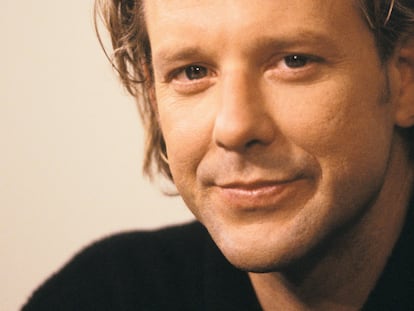
In his autobiography, Stories I Only Tell My Friends, Rob Lowe recalls his first meeting with Mickey Rourke, during the filming of The Outsiders (1983).
“A man – who looked like he was homeless – walked on set. He had long, dirty hair, stubble and torn, stained leather pants. Francis [Ford Coppola] walked up to him. The other actors pointed and whispered, ‘It’s Mickey Rourke!’ ‘Who?’ I asked. I’d never heard of him, but they adored him as if he were the son of Laurence Olivier and Jesus Christ.”
Rourke’s face has been completely changed by plastic surgery. Gone are the days when The Los Angeles Times defined him as “a young Hollywood lion, an actor with the melancholic intensity of Marlon Brando [and] the electricity of James Dean.”
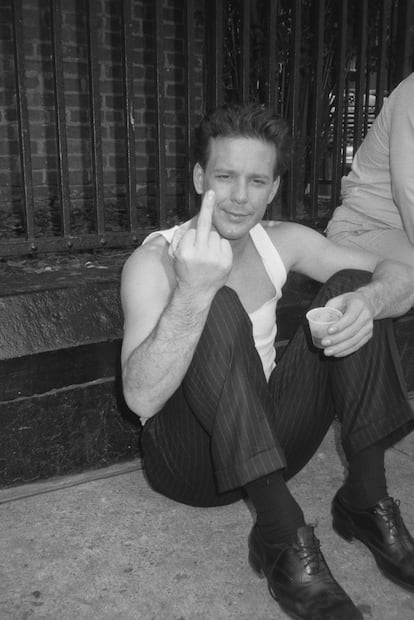
What cut short his promising career? The pop culture website Vulture spoke to many of the people who dealt with him throughout his life and the answer is clear: Rourke’s biggest problem has been – and remains – Rourke.
“I’ve had great moments in some movies, roles that most actors out there couldn’t play in their entire lives. But I’ve also made some mistakes. I don’t blame anyone else. I just hope I can learn from them,” he told The Los Angeles Times.
When Rourke visited the set of The Outsiders, he had already played a mythical role as The Motorcycle Boy in Rumble Fish (1983), a beautiful flop by Francis Ford Coppola, beloved by critics but ignored by the general public. Rourke portrayed a poetic and ghostly character, color blind and half-deaf. Coppola had also offered him one of the leading roles in The Outsiders, but he turned it down.
An actor is shaped by both the roles he accepts and the ones he rejects – and the list of hits Rourke has said “no” to is shocking. He got a call from Dustin Hoffman to co-star in Rain Man, which won four Oscars in 1988, including Best Picture – Tom Cruise ended up saying yes. Rourke also turned down roles in Platoon, The Untouchables and Pulp Fiction.
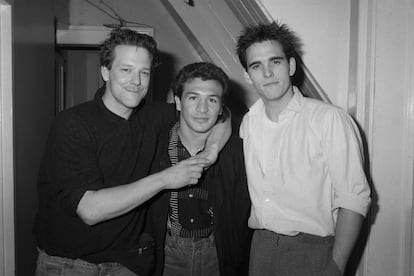
Rourke was attracted to boxing before movies. He grew up in a tough neighborhood in Miami – his father abandoned him when he was little and he was abused by his mother’s second husband, a violent police officer. He took refuge in boxing and tried to follow in the footsteps of his idol, Muhammad Ali. After two concussions and a broken shoulder, doctors forced him to take a breather. While recovering, he played a small part in a play by Jean Genet at the University of Miami.
“I didn’t know what the hell I was doing, but I loved it.”
Rourke moved to New York and joined the Actors Studio, where he quickly wowed everyone with his talent. His first film role was a brief appearance as an arsonist in Body Heat (1981). Getting noticed next to Katheleen Turner and William Hurt was an impressive feat.
“[That was when] I noticed him for the first time,” his co-star in Animal Factory (2000), Steve Buscemi, recalled years later. Eric Roberts felt the same way when he and Rourke acted together in The Pope of Greenwich Village (1984), an unknown gem about a pair of New York thieves.
“Mickey doesn’t learn the lines, his thing is 95% improvisation,” Roberts notes. That fondness for going it alone would end up taking a toll on him.
Adrian Lyne, his director in the erotic drama Nine 1/2 Weeks (1986), said that Rourke did not make it easy for him during filming.
“[Rourke] went out a lot at that stage of his life and had a hard time falling asleep. I even put someone outside his room to try and keep him from going out all night.”
Rourke starred alongside former Bond girl Kim Basinger. He went to great lengths to add his own touch to the production. Obsessed with Billy Idol, he would dishevel the neat, yuppie look that the makeup department had worked so hard to create. His lack of hygiene was also legendary. “It was like kissing an ashtray,” Basinger declared years later.
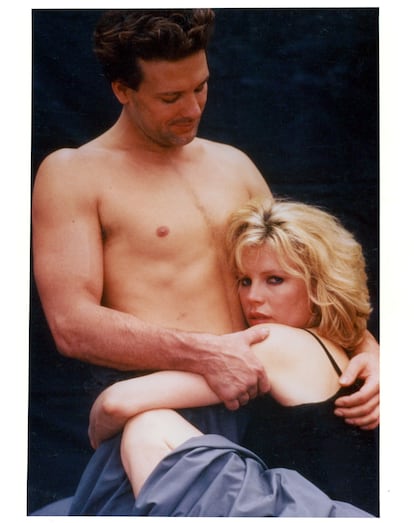
Nine 1/2 Weeks – which the Wall Street Journal called “a long Calvin Klein commercial” – was a financial and critical failure in the United States, but a huge success in Europe. In France, it remained in theaters for two years. Despite the contempt of critics, the film left behind iconic images, sold millions of soundtrack albums and turned the protagonists into sex symbols.
This got Rourke cast in Angel Heart (1987), a dark supernatural thriller, in which he had a hypnotic duel with Robert de Niro. Director Alan Parker was another victim of Rourke’s infernal character.
“Working with Mickey is a nightmare,” he told People magazine. “He’s very dangerous on set, because you never know what he’s going to do next.”
It didn’t take long for Rourke’s poor (or bizarre) choices to affect his career. He portrayed Charles Bukowski in Barfly (1987) – written by the alcoholic poet himself – and he blended in with him so much that when Bukowski died, the New York Post used Rourke’s picture in the obituary by mistake. He then starred in Wild Orchid (1989), an erotic film with a laughable script. He met his wife, model Carré Otis, on set. Their marriage would last only six years.
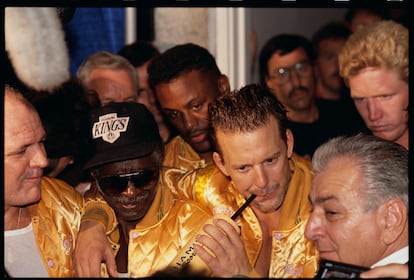
By the 1990s, his career was beginning a steep decline. The variations in his face made more news than his films. The tabloids speculated about a plastic surgery addiction, while he blamed it on boxing.
“My nose was broken twice. I had five operations on my nose and one on a broken cheekbone. Most of the operations were to fix the mess on my face from boxing, but I picked a bad guy to do it,” he explained.
At the age of 39, he returned to the ring. In 1991, he participated in a boxing match in Oviedo, Spain. The conservative mayor, Gabino de Lorenzo, organized the fight with the help of a Spanish boxing TV show. However, the event turned out to be a publicity scam: both Rourke and his rival stepped into the ring after a night of drugs and booze and pretended to duke it out.
Rourke’s career plunged further into decline. He began accepting roles just for the cash, even starring in an embarrassing sequel of Nine 1/2 Weeks. But in 2008, he made his comeback in The Wrestler.
“Darren Aronofsky [the director] told me: ‘Nobody wants me to do this movie with you because you’re not a star anymore and you’ve been ruining your career for 20 years… but if I get the money to do it, you’ll listen to everything I say and you will not disrespect me.’ I thought: ‘If you have the balls to say that [to me], you’re my kind of man.”
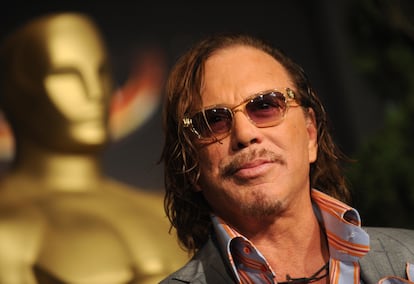
Rourke – who was already 56 at the time of filming – trained for months, did his own stunts and immersed himself in a story about a wrestler in decline that reminded him too much of his own life. The film won him a Bafta, a Golden Globe and an Oscar nomination. In the end, Sean Penn won the Oscar for Milk – but Rourke experienced a resurrection. He was later cast in Iron Man 2 and The Expendables (2010)... although he no longer bothered to read the scripts.
“You can be mediocre – like most actors – and still be an A-list movie star, even if your movies are boring and predictable. All you have to do is know how to sell yourself, let yourself be manufactured,” he told The Los Angeles Times.
Rourke’s fall from grace in Hollywood took its toll on his mental health. In 1998, he separated from Carré Otis, who accused him of abuse. He spent almost five months without leaving his house. After a long struggle, he ended up finding peace in his dogs.
“I started to self-destruct 14 years ago, when everything fell apart: my wife left me, I was sidelined at work, my career was over, I had no money... but the dogs were always there. I don’t have children, so they’re everything to me. I remember looking at them and seeing how they encouraged me to continue, to take care of them.”
Gone were the successful years when he could do crazy things, like buy six Cadillacs – in cash – in one shot.
“No one knew how broke I was. I was paying $500 a month for a one-bedroom apartment with a patio for my dogs.”
The dogs became his great support, especially his chihuahua Locki, who he frequently brought to red carpets until his death. On Alec Baldwin’s podcast, Rourke claimed, “If I could get a job walking dogs and get paid the same amount I make from acting, I would never do another movie.”
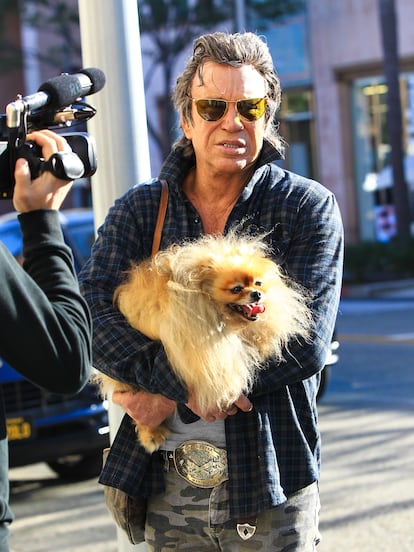
As walking dogs is not a very lucrative profession, Rourke has continued to dedicate himself to acting. He has 10 films pending release, including The Palace, directed by Roman Polanski. Perhaps, at the age of 70, his self-destructive phase is finally over.
Tu suscripción se está usando en otro dispositivo
¿Quieres añadir otro usuario a tu suscripción?
Si continúas leyendo en este dispositivo, no se podrá leer en el otro.
FlechaTu suscripción se está usando en otro dispositivo y solo puedes acceder a EL PAÍS desde un dispositivo a la vez.
Si quieres compartir tu cuenta, cambia tu suscripción a la modalidad Premium, así podrás añadir otro usuario. Cada uno accederá con su propia cuenta de email, lo que os permitirá personalizar vuestra experiencia en EL PAÍS.
¿Tienes una suscripción de empresa? Accede aquí para contratar más cuentas.
En el caso de no saber quién está usando tu cuenta, te recomendamos cambiar tu contraseña aquí.
Si decides continuar compartiendo tu cuenta, este mensaje se mostrará en tu dispositivo y en el de la otra persona que está usando tu cuenta de forma indefinida, afectando a tu experiencia de lectura. Puedes consultar aquí los términos y condiciones de la suscripción digital.









































